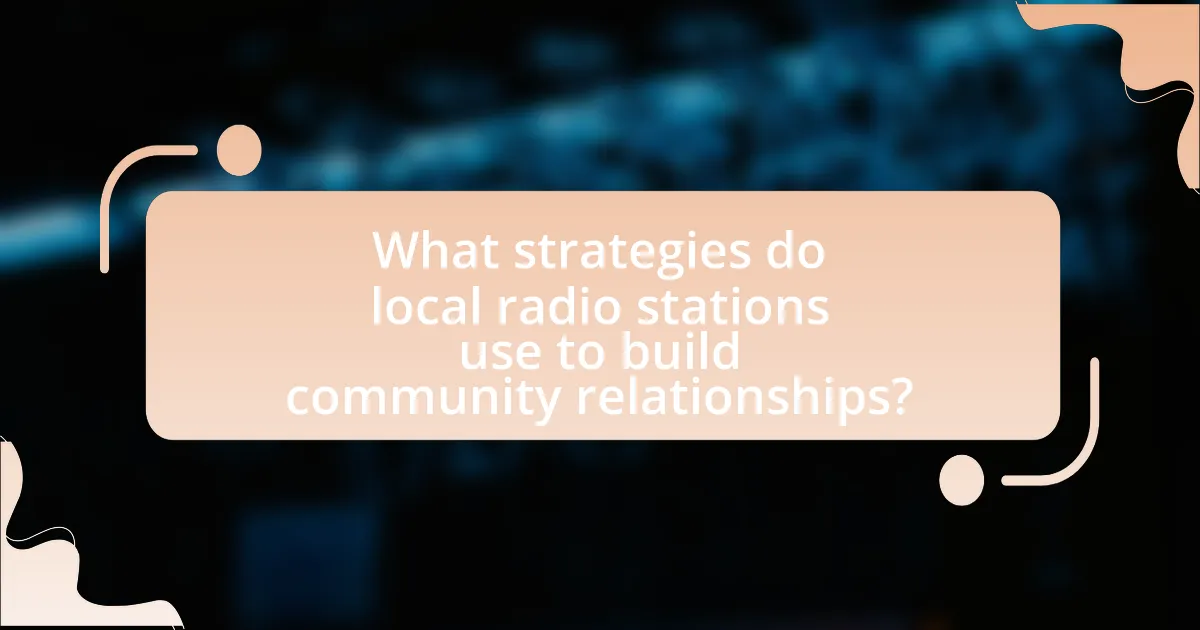Local radio serves as a vital platform for community building and fostering brand loyalty by providing localized content that resonates with listeners. It enhances community engagement through the promotion of local events, discussions on relevant issues, and listener participation, which strengthens social ties. The article explores how local radio influences consumer behavior, the psychological factors that contribute to brand loyalty, and the challenges faced by stations in maintaining community connections in the digital age. Additionally, it highlights effective strategies and best practices that local radio can implement to enhance its impact on community engagement and brand recognition.

What is the role of local radio in community building and brand loyalty?
Local radio plays a crucial role in community building and brand loyalty by fostering a sense of belonging and providing a platform for local voices. It engages listeners through localized content, such as news, events, and discussions relevant to the community, which strengthens social ties and encourages participation. According to a study by the Pew Research Center, 75% of local radio listeners feel more connected to their community due to the station’s programming. Additionally, local businesses benefit from advertising on these stations, as they reach a targeted audience that values community engagement, thereby enhancing brand loyalty. This symbiotic relationship between local radio and the community cultivates trust and loyalty among listeners, making local radio an essential component of community identity and brand recognition.
How does local radio contribute to community engagement?
Local radio contributes to community engagement by providing a platform for local voices, events, and issues that resonate with the community. This medium fosters a sense of belonging and connection among residents by broadcasting local news, promoting community events, and facilitating discussions on relevant topics. For instance, a study by the Pew Research Center found that 75% of local radio listeners feel more connected to their community due to the content they consume, highlighting the role of local radio in enhancing civic participation and community identity.
What are the key features of local radio that foster community connections?
Local radio fosters community connections through its focus on local content, engagement with listeners, and support for local events. By broadcasting news, music, and stories relevant to the community, local radio stations create a sense of belonging and identity among residents. Engagement is enhanced through listener participation, such as call-ins and social media interactions, which allow individuals to share their voices and opinions. Additionally, local radio often promotes and covers community events, strengthening ties among residents and encouraging participation in local activities. These features collectively contribute to a vibrant community atmosphere, as evidenced by studies showing that local radio significantly increases community involvement and cohesion.
How does local radio promote local events and initiatives?
Local radio promotes local events and initiatives by providing dedicated airtime for announcements, interviews, and discussions related to these activities. This platform allows event organizers to reach a targeted audience, fostering community engagement and participation. For instance, local radio stations often feature segments that highlight upcoming events, such as festivals or charity drives, which can significantly increase attendance and awareness. According to a study by the Pew Research Center, 62% of local radio listeners reported that they learned about community events through their local station, demonstrating the effectiveness of this medium in promoting local initiatives.
Why is brand loyalty important for local businesses?
Brand loyalty is crucial for local businesses because it fosters repeat customers, which directly contributes to sustained revenue. When customers consistently choose a local business over competitors, it enhances the business’s stability and growth potential. According to a study by the Local Business Association, 70% of consumers are more likely to support a local business they trust, demonstrating that brand loyalty can significantly increase customer retention rates. Furthermore, loyal customers often become brand advocates, promoting the business through word-of-mouth, which is particularly valuable in local markets where community ties are strong. This advocacy can lead to new customer acquisition without the need for extensive marketing expenditures.
What factors influence brand loyalty in local markets?
Brand loyalty in local markets is influenced by factors such as community engagement, product quality, and customer service. Community engagement fosters a sense of belonging and trust, as local brands that actively participate in community events or support local causes tend to resonate more with consumers. Product quality is crucial, as consumers are likely to remain loyal to brands that consistently meet or exceed their expectations. Additionally, exceptional customer service enhances the overall experience, leading to repeat purchases and positive word-of-mouth. Research indicates that brands with strong local ties and positive customer interactions see higher loyalty rates, as evidenced by a study from the Journal of Marketing Research, which found that local businesses with community involvement had a 20% higher customer retention rate compared to those without such engagement.
How can local radio enhance brand recognition among listeners?
Local radio enhances brand recognition among listeners by providing targeted advertising that reaches specific demographics within the community. This medium allows brands to connect with local audiences through tailored messages that resonate with their interests and values. According to a Nielsen study, 82% of listeners feel a stronger connection to brands that advertise on local radio, highlighting the effectiveness of this platform in fostering brand loyalty. Additionally, local radio often features community events and promotions, further integrating brands into the local culture and increasing visibility among listeners.

What strategies do local radio stations use to build community relationships?
Local radio stations build community relationships through engagement initiatives, local programming, and partnerships with community organizations. These strategies foster a sense of belonging and trust among listeners. For instance, local radio stations often host events such as fundraisers, concerts, and community forums, which encourage listener participation and strengthen ties within the community. Additionally, they provide a platform for local news, highlighting issues and events that matter to residents, thereby enhancing their relevance and connection to the audience. Research indicates that stations that actively involve themselves in community activities see increased listener loyalty and support, as evidenced by a study from the National Association of Broadcasters, which found that 70% of listeners feel more connected to their community through local radio.
How do local radio stations tailor their content to reflect community interests?
Local radio stations tailor their content to reflect community interests by actively engaging with their audience and incorporating local news, events, and cultural topics into their programming. They often conduct surveys and polls to understand listener preferences, ensuring that the content resonates with the community’s values and needs. For instance, a study by the Pew Research Center found that 70% of local radio listeners appreciate stations that provide local news and information, highlighting the importance of community relevance in programming decisions. Additionally, local radio stations frequently collaborate with community organizations and feature local artists, which further strengthens their connection to the audience and enhances brand loyalty.
What role do local news and talk shows play in community engagement?
Local news and talk shows serve as vital platforms for community engagement by providing relevant information, fostering dialogue, and encouraging civic participation. These media outlets facilitate discussions on local issues, allowing residents to voice their opinions and concerns, which strengthens community ties. Research indicates that communities with active local media experience higher levels of civic involvement, as these platforms often highlight local events, initiatives, and resources, thereby promoting awareness and participation among residents. For example, a study by the Pew Research Center found that local news significantly influences public engagement, with 62% of respondents stating that local news helps them feel more connected to their community.
How do listener feedback and participation shape programming?
Listener feedback and participation significantly shape programming by directly influencing content decisions and audience engagement strategies. Local radio stations often rely on listener input to tailor their programming, ensuring that it resonates with the community’s interests and needs. For instance, surveys and call-in segments allow listeners to express their preferences, which can lead to adjustments in music selection, talk show topics, and event coverage. This responsiveness fosters a sense of ownership among listeners, enhancing brand loyalty and community connection. Research indicates that stations that actively incorporate listener feedback see increased audience retention and satisfaction, demonstrating the tangible impact of participation on programming effectiveness.
What partnerships can local radio form to strengthen community ties?
Local radio can form partnerships with local businesses, schools, non-profit organizations, and community groups to strengthen community ties. Collaborating with local businesses allows radio stations to promote local events and services, fostering economic growth and community engagement. Partnering with schools can facilitate educational programs and youth initiatives, enhancing community involvement and support for local education. Collaborations with non-profit organizations can help raise awareness for social issues and mobilize community resources, while working with community groups can create platforms for local voices and concerns, ensuring representation and participation in community matters. These partnerships not only enhance the radio station’s relevance but also build a stronger, more connected community.
How can collaborations with local businesses enhance brand loyalty?
Collaborations with local businesses enhance brand loyalty by creating a sense of community and shared values among consumers. When brands partner with local businesses, they demonstrate commitment to the local economy, which fosters trust and emotional connections with customers. Research shows that 70% of consumers are more likely to support brands that engage in community initiatives, reinforcing loyalty through shared local identity and purpose. Additionally, these collaborations often lead to co-marketing opportunities, increasing visibility and engagement, which further solidifies customer loyalty.
What benefits do community organizations gain from partnering with local radio?
Community organizations gain increased visibility and outreach by partnering with local radio. This collaboration allows them to share their messages, events, and initiatives with a broader audience, fostering community engagement. For instance, local radio stations often have established listener bases, which can amplify the reach of community organizations’ campaigns. Additionally, studies show that radio advertising can enhance brand recognition, with 54% of listeners recalling ads they heard on the radio, according to the Radio Advertising Bureau. This heightened awareness can lead to increased participation in community programs and events, ultimately strengthening community ties and loyalty.

How does local radio influence consumer behavior and brand loyalty?
Local radio significantly influences consumer behavior and brand loyalty by fostering a sense of community and providing targeted advertising. Research indicates that local radio stations create strong listener relationships through personalized content and local news, which enhances brand trust. According to a study by the Radio Advertising Bureau, 82% of listeners feel a connection to local radio, leading to increased likelihood of purchasing advertised products. This connection is further reinforced by local endorsements, which can boost brand credibility and loyalty among consumers.
What psychological factors make local radio effective in building brand loyalty?
Local radio effectively builds brand loyalty through psychological factors such as familiarity, community connection, and trust. Familiarity arises from regular exposure to local radio content, which creates a sense of comfort and recognition among listeners. This consistent engagement fosters a personal relationship with the brand, making it more relatable and memorable.
The community connection is significant, as local radio often features local news, events, and personalities, reinforcing a shared identity among listeners. This shared experience cultivates a sense of belonging, which is crucial for brand loyalty. Additionally, trust is established through the perceived authenticity of local radio, as audiences often view it as a reliable source of information that reflects their community’s values and interests.
Research indicates that brands associated with trusted local media are more likely to be favored by consumers, as trust enhances emotional attachment and loyalty. For instance, a study by the Pew Research Center found that local news outlets are viewed as more trustworthy than national ones, highlighting the importance of local media in shaping consumer perceptions and loyalty.
How does the familiarity of local radio personalities impact listener trust?
Familiarity with local radio personalities significantly enhances listener trust. When listeners recognize and relate to radio hosts, they are more likely to perceive them as credible and trustworthy sources of information. Research indicates that familiarity fosters a sense of community and connection, which is crucial in building brand loyalty. For instance, a study published in the Journal of Broadcasting & Electronic Media found that listeners who feel a personal connection to radio personalities are more inclined to trust their opinions and recommendations, leading to increased engagement and loyalty to the station. This relationship underscores the importance of local radio personalities in shaping listener perceptions and fostering trust within the community.
What is the effect of local advertising on consumer purchasing decisions?
Local advertising significantly influences consumer purchasing decisions by enhancing brand awareness and fostering a sense of community connection. Research indicates that consumers are more likely to purchase from businesses they recognize and feel connected to, which local advertising effectively facilitates. For instance, a study by the Local Media Association found that 70% of consumers are more inclined to support local businesses when they see advertisements in their community media. This connection is particularly strong in local radio advertising, which builds trust and loyalty among listeners, leading to increased sales for advertised products or services.
What are the challenges faced by local radio in maintaining community engagement?
Local radio faces several challenges in maintaining community engagement, primarily due to competition from digital media, limited resources, and changing listener demographics. The rise of online streaming services and social media platforms has diverted audience attention away from traditional radio, making it difficult for local stations to attract and retain listeners. Additionally, many local radio stations operate with constrained budgets, which limits their ability to invest in community-focused programming and outreach initiatives. Furthermore, as demographics shift, local radio must adapt its content to meet the evolving interests and preferences of diverse community members, which can be a complex task. These factors collectively hinder local radio’s effectiveness in fostering strong community ties and brand loyalty.
How do changes in technology affect local radio’s reach and influence?
Changes in technology significantly enhance local radio’s reach and influence by enabling broader distribution and more interactive engagement with audiences. For instance, the advent of digital streaming platforms allows local radio stations to broadcast beyond geographical limitations, reaching listeners globally. According to a 2021 report by the Pew Research Center, 41% of Americans aged 12 and older listen to online radio, indicating a shift in how audiences consume radio content. Additionally, social media integration allows local stations to engage listeners in real-time, fostering community interaction and loyalty. This technological evolution not only expands the audience base but also strengthens the station’s role in community building by facilitating direct communication and feedback from listeners.
What strategies can local radio adopt to overcome these challenges?
Local radio can adopt several strategies to overcome challenges, including enhancing community engagement, leveraging digital platforms, and diversifying revenue streams. By actively involving local listeners through events, contests, and discussions, radio stations can strengthen their community ties and foster brand loyalty. Utilizing social media and streaming services allows local radio to reach broader audiences and adapt to changing listening habits. Additionally, exploring sponsorships, partnerships, and targeted advertising can help diversify revenue sources, ensuring financial sustainability. These strategies are supported by the fact that community-focused radio stations often report higher listener loyalty and engagement, as evidenced by studies showing that local content significantly boosts audience retention.
What best practices can local radio stations implement to enhance community building and brand loyalty?
Local radio stations can enhance community building and brand loyalty by actively engaging with their audience through local events, listener participation, and tailored content. By hosting community events, such as fundraisers or festivals, radio stations create opportunities for direct interaction, fostering a sense of belonging among listeners. Additionally, involving listeners in programming decisions, such as song requests or topic discussions, encourages participation and investment in the station’s identity. Tailoring content to reflect local interests and issues further strengthens the connection, as evidenced by studies showing that localized programming increases listener loyalty. For instance, a survey by the National Association of Broadcasters found that 75% of listeners prefer stations that focus on local news and events, highlighting the importance of community-centric content in building brand loyalty.
How can local radio stations effectively measure their impact on community engagement?
Local radio stations can effectively measure their impact on community engagement by utilizing listener surveys, social media analytics, and community feedback mechanisms. Listener surveys provide direct insights into audience perceptions and engagement levels, with studies indicating that 70% of radio listeners are willing to participate in surveys, thus offering valuable data. Social media analytics allow stations to track interactions, shares, and comments related to their content, revealing how well they resonate with the community. Additionally, implementing community feedback mechanisms, such as town hall meetings or focus groups, enables stations to gather qualitative data on their influence and relevance within the community. These methods collectively provide a comprehensive understanding of a station’s impact on community engagement.
What innovative approaches can local radio take to stay relevant in the digital age?
Local radio can stay relevant in the digital age by integrating multimedia content and leveraging social media platforms. By creating engaging podcasts and live-streaming events, local radio stations can reach wider audiences and enhance listener interaction. For instance, according to a 2021 Nielsen report, 54% of podcast listeners also tune into local radio, indicating a crossover potential that can be exploited. Additionally, utilizing social media for real-time audience engagement allows local stations to foster community connections and promote local events, thereby reinforcing brand loyalty.